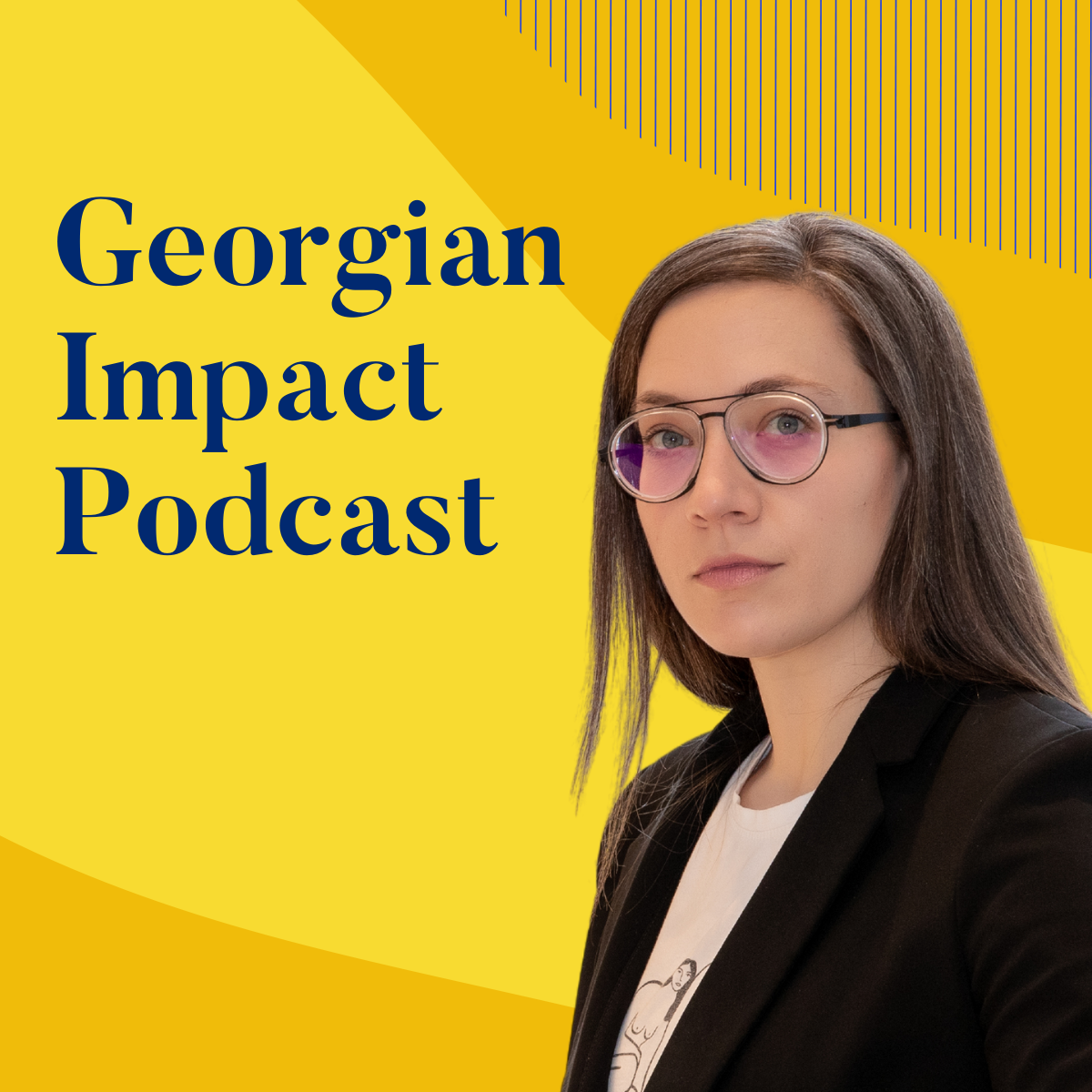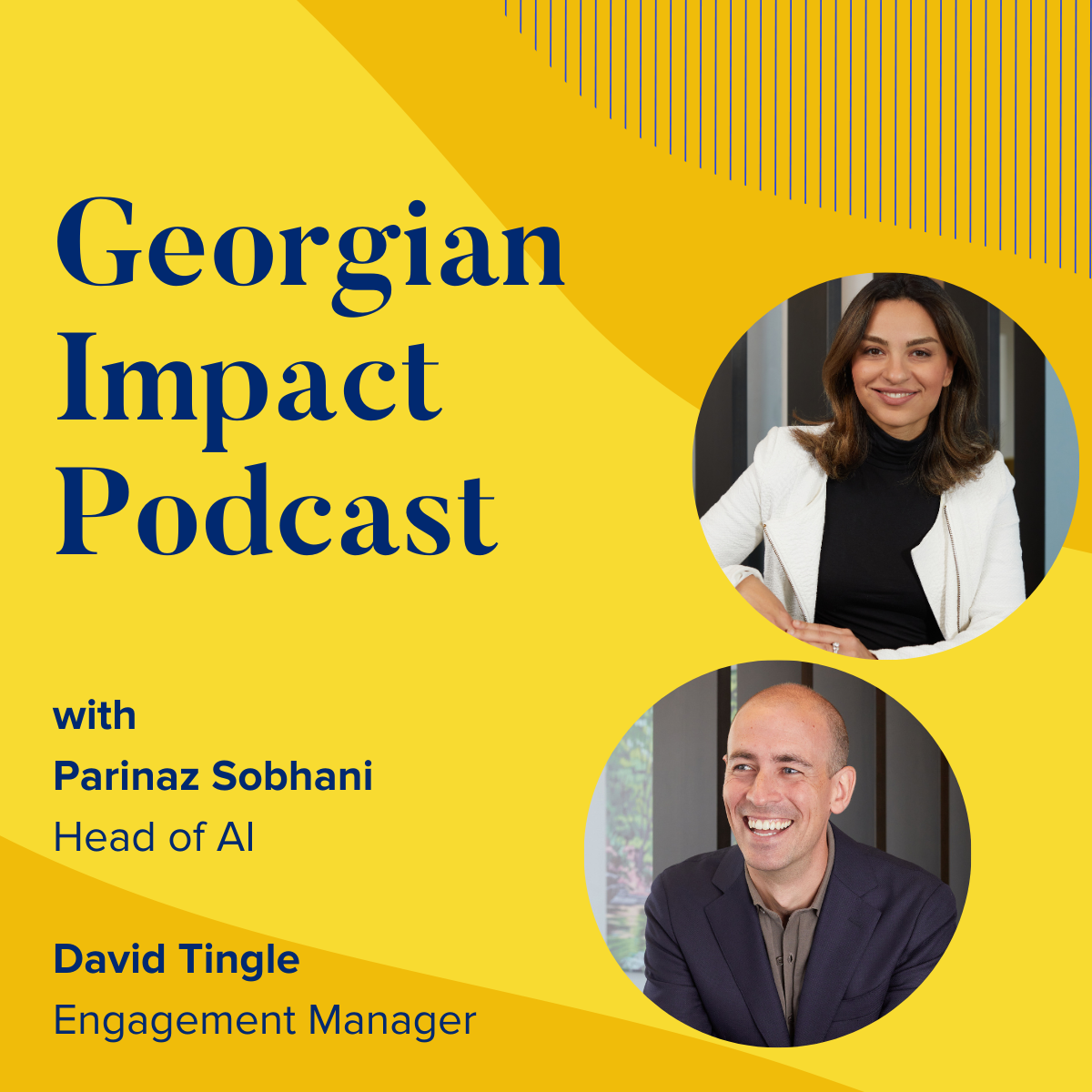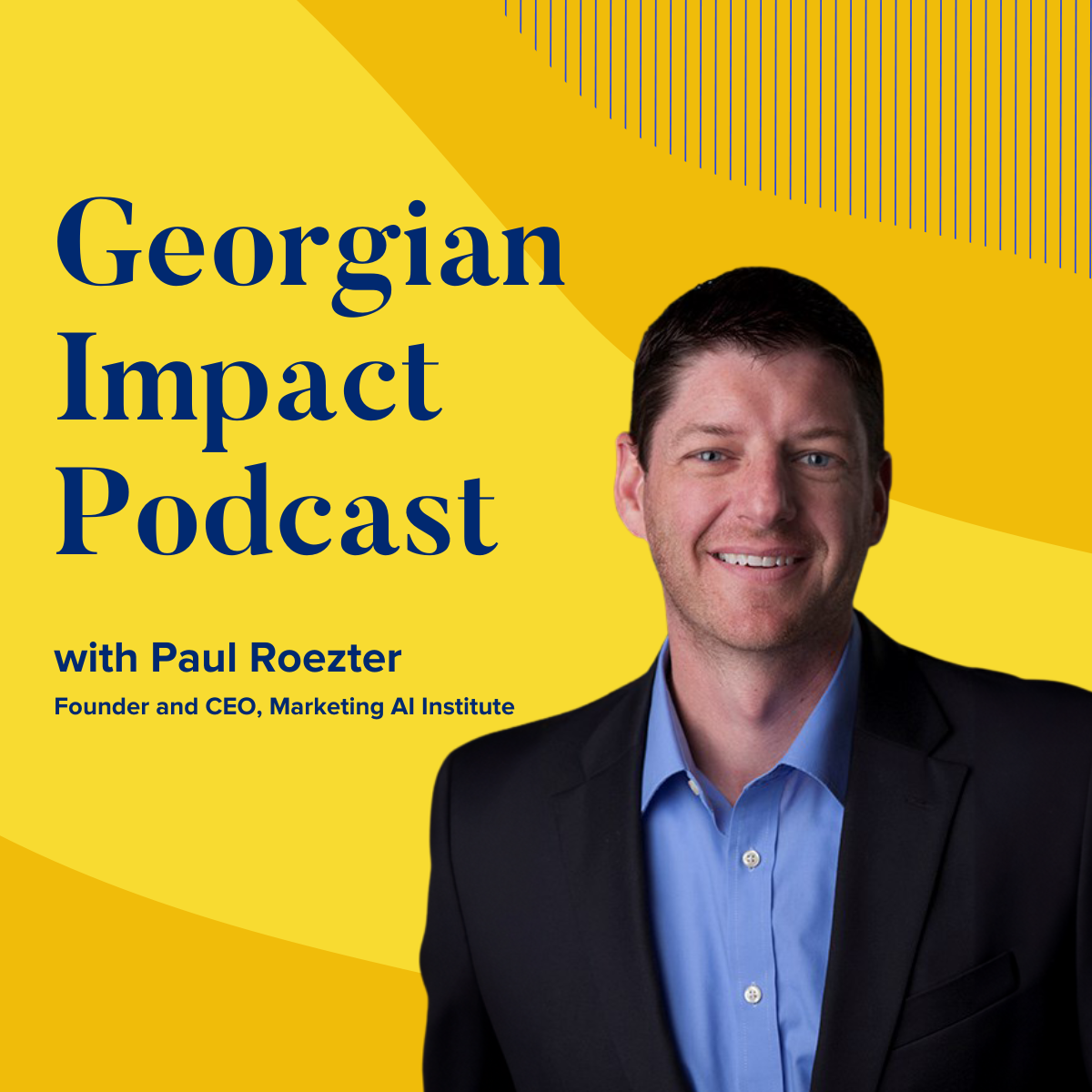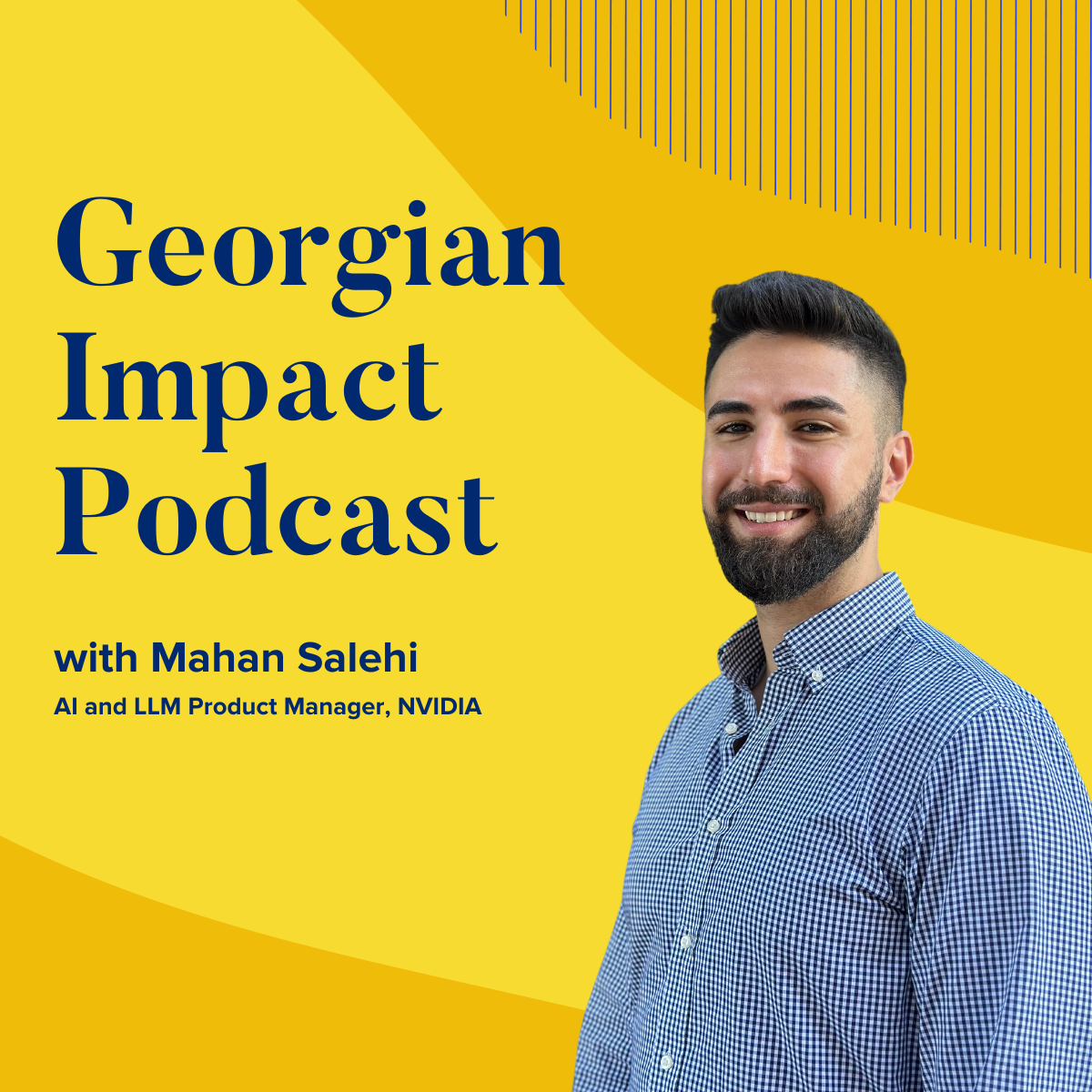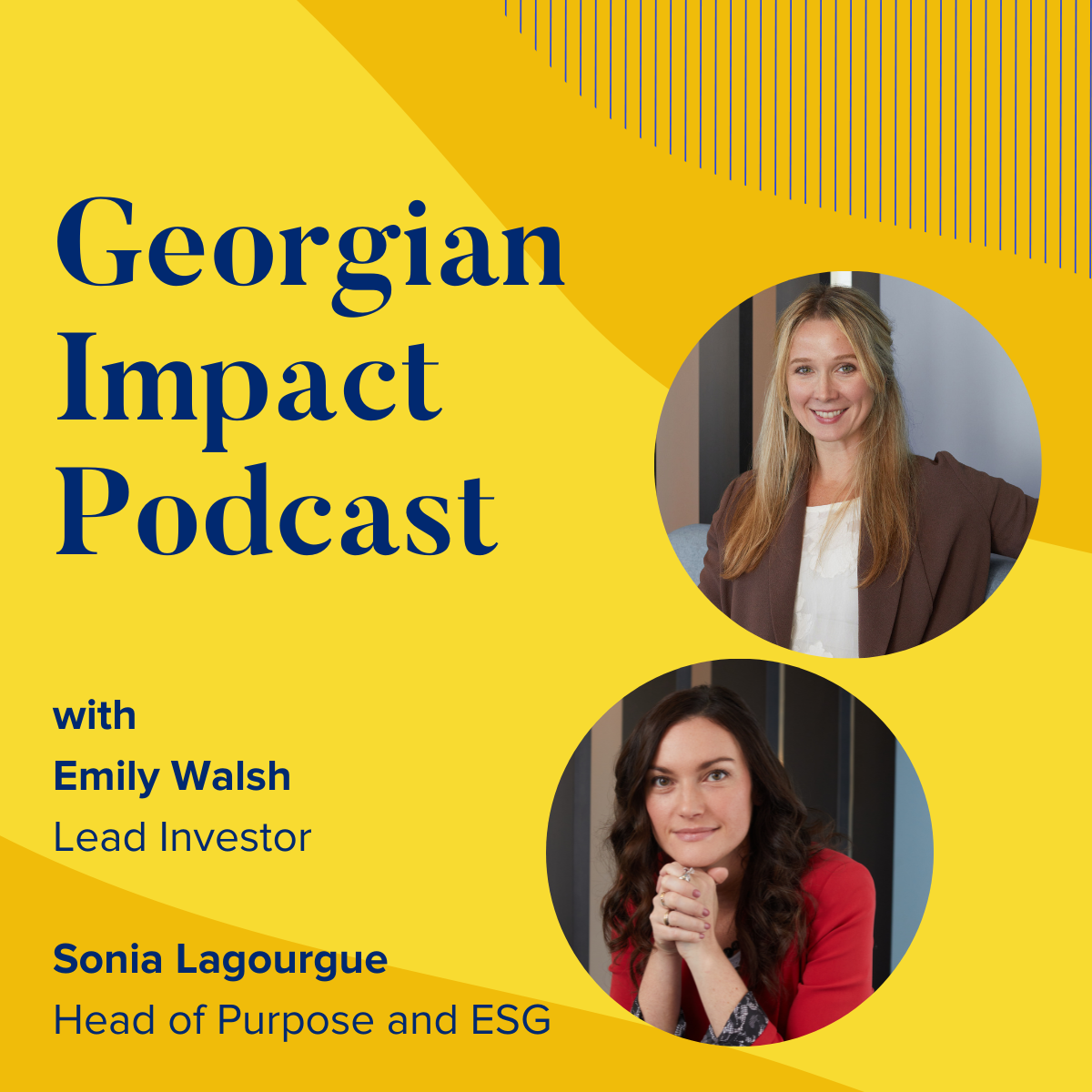McMaster University’s Vass Bednar Explains How Privacy, Public Policy and Innovation Intersect
- 0.5
- 1
- 1.25
- 1.5
- 1.75
- 2
Jon Prial: At Georgian, we bring entrepreneurs a wide range of podcasts that help them get to the right level of depth about technology and trends, so they can be more strategic about building their businesses. Today we have a fascinating discussion. I'm speaking with Vass Bednar, she's the Executive Director of McMaster University's Master of Public Policy and Digital Society Program. She's an Adjunct Professor of Political Science and is a Public Policy Fellow. I also recommend you read her newsletter, Regs to Riches. So here's Jon Prial, sitting with a professor, but this is not going to be an academic discussion. We have a wide- ranging chat on privacy, competition and advertising, and whether the status quo hurts or helps innovation. We even talk about what new regulations might bring to startups and how that could impact their relationships with those big companies out there. I'm Jon Prial, and welcome to the Impact Podcast. Last night I saw a TV ad for DuckDuckGo, of which their tagline was," None of our business." What are you doing at one o'clock in the morning, searching for stuff? It's none of our business. What did you just buy? I say, it's none of our business. But we know there are tons of companies out there that are looking to hoover up all the data they can find to build some type of profile. What's your take of DuckDucGo and what's happening in terms of the sucking in of all this data?
Vass Bednar: Well, I mean, DuckDuckGo is fascinating in that it presents an alternative to consumers. A lot of the time in these data driven markets it's hard to find alternatives, or consumers lack that choice at the very least. And what they do is they present privacy as a competitive advantage, privacy as quality of their product. And they're putting consumers in the driver's seat. I love that frame of" none of our business," because some of what concerns me a little bit more, beyond challenges with data governance or people not being able to fully and freely consent to data that they're volunteering, is how that data or information can be integrated across platforms. Or across in very large companies, subsidiaries that they own, et cetera. There's a particular opaqueness that is worth talking about and educating people about so that we can have a more fulsome conversation about it. But I love that you saw a commercial for it because, hey, it's still an ad, but it's showing up in an interesting place, your television. That's kind of cool too.
Jon Prial: I was very excited about it. And I'm definitely going to go down the path with you, we're going to talk about silos a little bit.
Vass Bednar: Okay.
Jon Prial: I just think as you talk about company and privacy as differentiation, I don't give Apple an A plus or even an A, but I'll give them a higher score than most any other company in terms of privacy as a differentiator for them. They still hoover up lots of different data within their space, so I'm not sure they're just protecting their own fiefdom or doing the right thing for humankind.
Vass Bednar: Well, with Apple, there's some interesting cases right now, just looking at their app store and gatekeeping looking at that 30% commission. Is it fair, is it unreasonable, is it the right norm? And also whether or not they need to be required to open their payment processing, not to be boring, but their payment processing to other operators. They're skimming money off every transaction that happens in apps that they have so let's talk about it. But you're right, by and large they tend to do a better job. And I think what they definitely deserve applause for, or at least a lot of emojis or hearts, because how else can you communicate online, was their app store change around having people opt in to location services, to tracking. And really helping people, again, opt in a much more clear way. And I think that's helped provoked really important conversations and helped people reevaluate what's going on on their phone.
Jon Prial: I wonder though if that's too granular, this thought about this collection of data. At the end of the day, my view, and I really want to hear your comments on this, is they're trying to develop the persona of what they consider you to be so that all kinds of things can happen, particularly selling things. I'm not sure we consumers really know the why of it yet. What's your sense?
Vass Bednar: I'm not sure. I think you're right that consumers may not fully appreciate the why. Often firms will explain," Oh, these are aggregate profiles." It's people like Vass, geriatric millennial, educated women with glasses who live in a city and have this type of job. And companies are doing that to make predictions and de- risk advertising to you. It's actually about de- risking what they spend, if they're trying to court business from someone, or if they're trying to sell access to that information through a platform. But again, back to what should consumers know more about or worry about. You and I were chatting about a Netflix show called Don't Look Up. We were also chatting about books. I mean, if we take Amazon, Amazon owns Good Reads. It owns IMBD. It has their Amazon Prime where they're producing content. They recently purchased MGM I believe. They of course own, I mean, not own Amazon, they are Amazon. They know the book seller, they know passages that people are highlighting in books. They know books that people are pre- ordering. This is a company that can scoop up the rights to something that is demand driven, data driven, that can give us what we want before we know as a collective that we want to consume this content. Is that innovation, or is that some kind of weird demand driven cultural content. Where also, how are artists or the original people producing the source content being compensated or credited for producing something that goes on one of those platforms in order to reach audiences? I hope that's not too abstract, it's something I've been thinking about recently.
Jon Prial: No, I think it's great. And it's interesting, but you just talked about where silos are breaking down-
Vass Bednar: Yeah.
Jon Prial: ...because of movies and purchases. And if I'll take that Amazon piece one step further, if you have an Amazon Fire Stick and you are not sure where this movie is, you could still search on Amazon... It'll tell you," Oh, it's on Netflix or Hulu." And I have the same thing because I use Roku and I'm thinking," Do I like this? This is so convenient." But all of a sudden Roku used to be this great technical service, and now I realize they're just another marketing engine gathering more data about me as well.
Vass Bednar: Right, yeah. Convenience, efficiency, a frictionless life, these are all things that are valuable, and that many of the time or most of the time we do want. But again, consumers, customers, people, I shouldn't call them consumers, not just when you're buying things, too often they're not in the driver's seat. It's hard to turn off some of that data collection that we mentioned with Apple's update that people are so familiar with. Can't turn off the algorithm on Netflix for what they're advertising to you. You can't only search via something being alphabetical or the most recent additions. Why not? What if people don't want to be governed by a algorithm in that way or subject to that kind of predictive profiling? I think that's kind of on the horizon for policy conversations.
Jon Prial: Excellent. And I'm going to come back to algorithms as well.
Vass Bednar: Cool.
Jon Prial: But the space we're on at the moment, I guess the word is surveillance capitalism.
Vass Bednar: Yes.
Jon Prial: It's Shoshana Zuboff, it's inaudible this is. And I guess the question for me is, are we just talking about business models and does that open the door for regulation? I mean, we're saying," Oh, but we're giving you this stuff for free. Why would you regulate me because it's for free." And then how did the regulators begin to think about that?
Vass Bednar: Well, at the start it was really dead difficult for regulators to conceive of it because our legislative environments hadn't contemplated, as you said, receiving something for free. You couldn't really go to consumer protection and say," I got this for free and this happened." There wasn't a payment. We don't view privacy or data as a form of payment though. We increasingly recognize it as something that's a value and something that is to be volunteered or donated. Another reason is just because of how our governance structures are structured. To have meaningful, comprehensive policy responses to a digital economy, you can't just pick one toolkit out of your box. I'm using terrible cliches, but it's not just-
Jon Prial: They work. They work, they work.
Vass Bednar: Okay. It's not just about competition policy. It's not just about taxation. It's not just about privacy. It's also consumer protection and labor. You have to be thinking about modernizing these instruments in concert. And I think what frustrates people, and I include entrepreneurs and innovators and the private sector in that, is that we are having these conversations in a kind of piecemeal way. And that can be really frustrating and onerous for everyone.
Jon Prial: Interesting. We don't like the silos of data, and it's almost hard to think about regulating in a silo piece as well, but maybe one step at a time is the only way to go. The Biden administration has a thing now, if you go to Google... We opened with DuckDuckGo.
Vass Bednar: Yeah.
Jon Prial: And you do a search on Google, the first seven responses are going to be Google properties. And I think there's a bill right now... Oh, I found it, it's the American Innovation and Choice Online Act, so that Big Tech companies can't favor their own services in an anti- competitive way. It's why I like DuckDuckGo. I think they're on the top of the fold finally, the results I'm looking for.
Vass Bednar: Yeah. I admire that piece of legislation as a provocation, but I wonder if it's necessary to target only the largest technology companies. Because self- preferencing is not really a new behavior. We're familiar with it in the grocery store, where grocers self- preference their own products, give them good shelf space, whatever. But-
Jon Prial: Or they're paid for by the... The vendors pay for their crosstalk.
Vass Bednar: Exactly. And other vendors pay.
Jon Prial: They get paid for it. There's no difference, right?
Vass Bednar: Just like online. But here's another throwback, at least Google labels those properties. Most often we're not even labeling the products that are being self- preferenced. They may be a private label product that's owned by the, again, be it the platform, be it the grocer. So these online third party marketplaces are becoming a norm, they're not just the purview of big technology companies. If you're listening from Canada or if you've been to Canada, TheBay is now an online third- party marketplace. And they've got plenty of private label products that they are very happy to self- preference in searches. Loblaw too, very popular grocer. They have President's Choice, PC, or No Frills,. Anyway, I'm saying things that are very Canadian so I apologize for your American listeners.
Jon Prial: Well, Kirkland and Costco, there's Kirkland brand.
Vass Bednar: Kirkland, perfect.
Jon Prial: There we go.
Vass Bednar: Yeah.
Jon Prial: Yeah. So it is interesting. I don't expect to walk through a supermarket and see the pile of Triscuits at the end of the end cap, with a sign that says," These Triscuits, brought to you by in Nabisco," for X dollars a month or whatever. But I guess that's... And it is interesting about big and small and... And I like making the contrast between E and brick and mortar.
Vass Bednar: Yeah.
Jon Prial: A new term I learned about, and I guess it was another American FTC thing that happen. I never knew about a monopsony. You're a professor, you can do better than me on words like that.
Vass Bednar: I'll try.
Jon Prial: But it's interesting because we say, is free okay. Well, monopsony hurts... I think they went after a bunch of publishers because the people being impacted were the writers.
Vass Bednar: Right.
Jon Prial: It was almost like a cabal of publishers and hurting the writers. And maybe Amazon could even be part of that because they do or not to choose to publish people's things. Does that change a little bit or is that a reasonable thing to discuss with you?
Vass Bednar: Yeah, totally reasonable to discuss. I mean, monopsony, it's related to monopoly when there's a single buyer in the marketplace. So with online platforms or apps that govern platform based work, of course, I think Uber pops to mind most often for most people, you could say that this is an instance of monopsony power. You have one purchaser, you have one employer, one platform. I know they don't think the people that work for them are employees, so the matchmaker that can control the price and availability of work. So then questions come up, like are the algorithms that govern this work collusive? Is there enough transparency? Is there enough accountability? And because there's so much digitizing, I mean, I don't want to be boring, but recently I read that book about shipping by Christopher Mims, like next day delivery.
Jon Prial: Yes, I heard him interviewed recently. Yes.
Vass Bednar: He's so fun. And he makes this very tiny point in the book that there's been so much consolidation across shipping platforms that there's basically one company. So an instance of a monopsony that can set the rates for shipping, because they know what everyone else is charging and where they're going because of that mass of information. That's related to what we were talking about before, what are we giving up? Where's that information going and what kind of market power or how does it empower particular businesses, and is the consumer aware? And if I can say one more thing, and it's not quite related to shipping, but it is related to the self-preferencing of private label stuff we were fretting about. Another really big risk for entrepreneurs, independent sellers that are, frankly, forced to participate in these online marketplaces, is that they make themselves vulnerable to being completely copied and ripped off. We see this time and time again. We see it happening at Target. We see Target saying," Okay, these red T- shirts are really popular, so we are going to knock off this product. Knockoffs, not historically new, imitation, there's always been markets for that. But then they either price discipline by undercutting the product or kick them out of the market entirely. Again, there are charges that Amazon may have done this. And if this is the cost, back to the cost, the price of participating in these marketplaces or in this digital society, I think we need to talk about it more and we don't necessarily need to accept it as the default. Again, for somebody, a firm whose product or service you might be supporting wants to be able to compete. Well, they should be able to do that fairly.
Jon Prial: You want to be successful, but you can't let the big guns say... Well, third- party merchant on Amazon. You're successfully selling this widget, but once you sold a million dollars worth of these widgets, they're going to private label the widget.
Vass Bednar: Yeah.
Jon Prial: And you're right, because I like going back to brick and mortar and historical. These fashion's have always been knocked off, it's always been the case. And then we have this strange world of fast fashion. I guess one element is regulation, which we'll see.
Vass Bednar: Yeah.
Jon Prial: The other element I like, it was Regs to Riches blog, and I never heard the term algorithmic resistance because we've been talking about business models.
Vass Bednar: Oh, yeah. Yeah.
Jon Prial: But I like that. And I think it's hashtag" decline now."
Vass Bednar: Right. It was DoorDash workers worked together to game the algorithm that governs their work, and agreed they would all turn and down the lowest paying work. I think it was fascinating to also just talk about what kind of regulatory environments do we need to recognize that someone's boss might be an algorithm, or that we're treating people like robots. Or that we have a lack of transparency in these bidding and marketplaces. Anyway, I think it was a really great example. And these workers shouldn't have to do that, but good on them.
Jon Prial: I've been learning a lot about these fast delivery services that are popping up, especially in New York City. And I mean, fast delivery. Many warehouses, within a mile radius of people, touting 15 minute delivery. One of the newer entrances from Europe, they're called Getir, and their delivery people are employees, not gig workers. In reading about the differences from a worker perspective, one advantage I see is that the employees get access to a bathroom. Oh my.
Vass Bednar: Look, that's being a good employer, being a humane employer. Maybe that's the new fair trade, et cetera. Maybe we're going to see more people really caring about the labor behind these kinds of delivery aspects for sure. And maybe the gig model, without any kind of benefits or security, is going to go the way of the Dodo, since I'm on my cliche streak over here.
Jon Prial: I'd like to talk just a bit about these mega companies, and get your sense of, are we losing the opportunity for innovation? And I always feel like the innovation comes from the startups. Is it the innovator's dilemma on these big companies? Or can they just suck at enough data and do something clever because they're not the dumbest dinosaur in the world? I don't know. But I'm curious what your thoughts about how the mega companies are going to potentially impact startups.
Vass Bednar: Well, one of those five pieces of legislation being proposed in the US is related to killer acquisitions. So I think that's one aspect that we think about a lot, scholar, at least, in the case of new entrants to the market startups. And the ability to compete with, I'll say, large incumbents, the largest, most dominant incumbents. In terms of data and being able to compete, back to knowing your customer and targeted ads, there's also a lot of evidence that shows targeted advertising just doesn't work. So maybe that's become a bit of a bubble or a bit of a sham, and we can maybe minimize that expenditure. You also think about companies getting out the gate, and you know this better than me. What kind of expenditure do they need to have on their Facebook ads and Google ads? There's a reality of just, again, the ability to participate in these marketplaces to get the word out. You're naturally dependent on Facebook and Google, I think. Though you can make the case, of course, that you have alternatives. You do, but they're probably be more expensive and maybe not as wide- ranging. Back to your question, what does it mean? Well, for some companies, their strategy may be to be acquired at some point. And that can be exciting and that can be a way for them to grow or to reach more customers much more quickly. In terms of the lack of direct competition for these large companies, I think it's increasingly of interest to regulators and to people to really think about that lack of alternatives. And we need more research.
Jon Prial: A little bit of a follow on from manga companies, is something that doesn't really exist yet, at least in North America or most of the world, the term that I'm hearing now is the super app. And the one app that I guess really is the super app in China is WeChat. And I was in China, pre- COVID for a wedding. And was the coolest thing is we went to a bubble tea store to get our bubble tea, and we were ordering it on WeChat. And then we pushed another button and rolled virtual dice. And if we got a seven our bubble tea was free. And we didn't get a seven and we paid for our bubble tea with a credit card and we walked away. And I'm thinking to myself who got the data that I bought this bubble tea? I mean, I could see a benevolent super app that becomes... Maybe Apple becomes the benevolent super app provider so that you, the bubble tea store, keeps the data about your customers. But the super app provider isn't necessarily sucking in that data. But they provide all these tools and maybe they take a piece of the action for that and it's money, but it's not necessarily privacy. I'm wondering if business... We talked about business models more than algorithms, which I find fascinating.
Vass Bednar: Yeah.
Jon Prial: Because we always talk about algorithms in AI and we're not, which I think is great. I'm wondering if we could evolve to something that would be more interesting?
Vass Bednar: I mean, we can always evolve. One thing in your story, it sounds like you and your friend each paid the same price. And that that was a posted price for the bubble tea. Because we do see online so much algorithmic personalized pricing, and that's informed by your profile. Now back to that brick and mortar world. Fine if you're in a more well- to- do neighborhood, sometimes groceries do cost a little bit more and people are little bit aware of that. But again, lack of transparency for the consumer. You and I might get a different price for... I don't know what we're both shopping for, but I bet it's really cool. What I like about your bubble tea example is heading in the movement to payments. Because I think in that race to potentially become a super app, alongside the payment processing space, is the health tech base. And we know that wearables are not, at least in Canada, they're not a medical device. They don't fit what we conceived of so many years ago as a medical device, but they increasingly position themselves as one. So having our health information, having our purchase history, knowing where we shop and what we buy for grocery stores, could it be that if, I'll give a Canadian example, Loblaw knows about my, I'll say fondness, for Miss Vickie's salt and vinegar chips, that my health insurance premium is going to go up at work because they have the evidence that I'm not following a particular diet. It's funny and it's silly, but we're actually not that far from it. Can we have a benevolent situation with it, where people are opting in and saying," Yeah, nudge me. Give me incentives. Give me a discount for buying apples or healthier foods." Maybe, I think we already see that happening with loyalty programs and points programs. And something you mentioned, which is like the gamification of shopping. But as it slips into the kind of... Is this a word, gamblification?
Jon Prial: I like it, I like it.
Vass Bednar: Like more gambling or bidding yourself? I mean, yeah, now I'm being silly, but why isn't everything we purchase online an open auction between me and the bot and the seller? Why can't I say," Sure, I want those..." What do I want to buy? I don't know. I'm looking around my desk, a water bottle. But why don't I just say," I'll give you$1 for it." Again, being silly, but what's the future and how do we balance consistency and transparency in marketplaces with the kind of dynamism that people may want, and that an online marketplace naturally facilitates.
Jon Prial: We got a couple places I went down hearing you. One is it doesn't have to be online, it's probably a decade old now. It's the Target story where the father got the mail, where they identified that the daughter was pregnant because of what she purchased. So we have to figure out how we fence that. The flip side, as I think about the healthcare side. I've got a kid that says," I'm perfectly happy with targeted ads. They can have everything they want about me, because I like the ads." And I may say," I'm a safe driver, so give me cheaper rates," and all that. Person's smoking, give that person higher car insurance rates. And that person overdoes Miss Vickie's chips, maybe that person should get higher healthcare rates. I would rather see an average and I'd rather see bell curves, where we don't have to have so many fine points. But maybe I'm naive in thinking where this is going to go.
Vass Bednar: I don't think you're naive. I think it just, the questions go beyond the binary. Where's the transparency, where's the accountability? Why did you see that targeted ad? I think people would like to know.
Jon Prial: Yeah.
Vass Bednar: I think consumers deserve that." Why am I seeing this? What data factored into that?" And also, back to the integrating across verticals. Sure, give up that information, but did you know that that information about books that you're searching for is informing the rights, the cinematic rights, to a film being produced, et cetera? No, you think you're just signaling that you liked that book or something. So that's where I think there's more of a disconnect. And where we need to just tell better stories too, and go beyond us being profiled as individuals. And also understand, again, in aggregate those implications from a competition perspective and also from a... I think it makes art and cultural pieces... And this goes to music too, I think it makes it all the more boring and bland. And that's a real. Spotify, we didn't talk about music, but Spotify is basically beholden to the Big Three record companies. It's not this independent, benevolent music algorithm. Anyway, separate conversation.
Jon Prial: What would you like to see in the short term in terms of maybe the most important regulation that you'd like to see?
Vass Bednar: Oh my gosh.
Jon Prial: Or focus on.
Vass Bednar: crosstalk important.
Jon Prial: You love all your babies. All your children are great.
Vass Bednar: Okay. I used to daydream about being the bot tsar, just regulating online chatbots because it made me so angry that they could impersonate humans. I didn't think that should be allowed. But the most important thing I think regulators can think about doing is just be committed to radical incrementalism. There's a lot of stuff we can do that's a no- brainer, that's low hanging fruit. I think of Lina Khan's recent announcement that she's... I mean, I'll use the phrase going after, but Planet Fitness.
Jon Prial: Yeah.
Vass Bednar: How hilarious is that? Just that example of," Listen, if you sign up online, you got to be able to unsubscribe online." It's basic consumer protection. It's clear, it's fair. People expect it from the role of the state. And that's where I think if you look for examples like that, where you can improve people's online experiences, bring more transparency and accountability, then you're doing something right. And then just keep doing that, do more and more and more of it. That's what people should do.
Jon Prial: That's fantastic. Vass, thank you so much for taking the time. This was just extraordinary conversation.
Vass Bednar: I had so much fun talking to you. Thank you.
DESCRIPTION
In this episode, we have a wide-ranging discussion on privacy, competition and advertising with Vass Bednar. Vass is the Executive director of McMaster University's Master of Public Policy in Digital Society program and works at the intersection of public policy and technology in Canada.
You’ll Hear About:
● DuckDuckGo as an alternative option for consumers in a data-driven world.
● Apple’s approach to data collection.
● Consumer concerns surrounding data collection.
● The evolving way the digital economy is regulated.
● A potential shift in the gig economy with a focus on workers.
● How mega-companies will impact start-ups and innovation.
● The importance of radical incrementalism when it comes to regulation.
